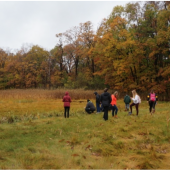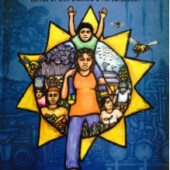
Abstract: This paper reports part of a larger study on the development of systems thinking skills in German 7th grade comprehensive school students regarding the climate. Research has shown a fragmented understanding of climate change among students that hardly accounts for the dynamic interrelations in the climate system and may pose a barrier in understanding adaptation and mitigation strategies (Shepardson et al., 2017, 2011, Calmbach 2016). While much is known the impact of short-term interventions on the general system understanding of students, what is lacking to date is 1) a specific intervention on climate system understanding and 2) insights into the process of developing system understanding in students. Helpful insights in this context come from Conceptual Development theories for they allow the development of systemic thinking to be viewed in terms of conceptual expansion or conceptual change. Starting from these desiderates, a teaching-learning sequence was developed based on the SYSDENE model of system competence (Frischknecht et al. 2008). In the sequence young learners systematically link experiences from formal science education with the experiences at three non-formal learning environments. A mixed-methods approach was used to explore the impact of this 3-month sequence on 19 7th grade students. A written pre-/post-test suggested a significant improvement in Climate System Reconstruction for the group (pre-test Median = 6.75 vs. post-test Median = 12.5, Wilcoxon Test: p = .003, r = .82). However, a qualitative analysis of classroom conversations, interviews and concept maps indicated that cognitive development toward a higher level of system thinking was neither continuous nor did every student reach it. Moreover, the SYSDENE model’s Competence Area “Describe System Model” proves critical. Being able to describe the main climate system factors is not sufficient, one also needs to be able to distinct weather from climate and grasp several scientific concepts related to the climate (e.g. greenhouse effect, water cycle, evaporation, reflection) in order to understand climate as a system.
Continue Reading
Abstract: I find it concerning, as a former elementary teacher and now a teacher educator, that not much attention is given to the preparation of new teachers on the environmental and social crisis of climate change. I have taught in two teacher preparation programs at public universities in the United States and understand the complexities, barriers, and limitations that these programs must contend with when trying to implement something new into an existing curriculum. In this paper I will describe my first attempt in navigating through the process of trying to include climate change education into a teacher preparation program. The focus of this initial effort was to understand the climate change literacy and self-efficacy towards teaching about climate change of the students in my elementary science teaching methods course.
Continue ReadingAbstract: This thought piece proposes the adoption of a new “3 Rs” to inform a climate-responsive environmental and sustainability education (CRESE): reclamation, resilience, and regeneration. As a changing climate becomes the larger campus of our learning, denial and top-down emergency preparedness both prove to be insufficient. We are invited into a deeper approach. Reclamation and resilience fold in (1) the saving of enduring biocultural lifeways and patterns and (2) the dynamic flux-states of panarchic socioecological resilience models. These two partner with (3) regeneration: context-responsive social collaborations; eco-socially-embedded capacity building systems; and the promise of regenerative design. These three approaches allow us to re-envision educational systems and encounters that are proactive rather than only reactive or responsive in metabolizing persistent climatic volatility. These three approaches – reclamation, resilience, and regeneration – echo the three approaches to climate change that Pelling has suggested (2009) – mitigation, adaptation, and transformation. Note, however, unlike Pelling’s model, these approaches are conceived as simultaneously requisite literacies and movements rather than as competing. Reclamation, resilience, and regeneration represent ever-more-complex types of capacities and support capacity building aimed together toward life-supportive, dynamic, complex systems transformations. Environmental and sustainability education that fosters skills of reclamation includes preservation, conservation, recording, and the establishment of libraries and sanctuaries of exemplar systems. Environmental and sustainability education (ESE) for resilience includes network extension and adaptive capacity building. ESE for regeneration nurtures emergent complex systems metacognitions, creativities, and transformative, transgressive social approaches that are connective, disruptive, and innovative and model and embody complex emergence. Regenerative ESE fosters skills to facilitate catalysis of emergent regeneration, self-organization, and transformation into more complex living systems. All of these position embedded learners in pro-active, systems-intensive embodiments of the types of living networks that foster survival, flexibility, thriving, and phase-change during our entry into a time of consistent climate turbulence.
Continue Reading
Abstract: The anthropocene era is one that is rife with ecological and social crises. Although many have been aware of the enormity of these problems and their systemic roots, the widespread educational response has not been sufficient in preparing youth to take part in creating a more just and sustainable world. Climate change is an umbrella issue for much of what the worlds facing. It is time for teachers to take the lead in using the classroom as a place to bring relevant, critical, joyful education that will lead to action in this crucial time. The following article is a book review for A People’s Curriculum for the Earth, a powerful resource for helping teachers equip students to confront our interconnected global crises, especially the climate crisis, and to highlight stories of teachers, activists, and organizations working to make a difference.
Continue Reading